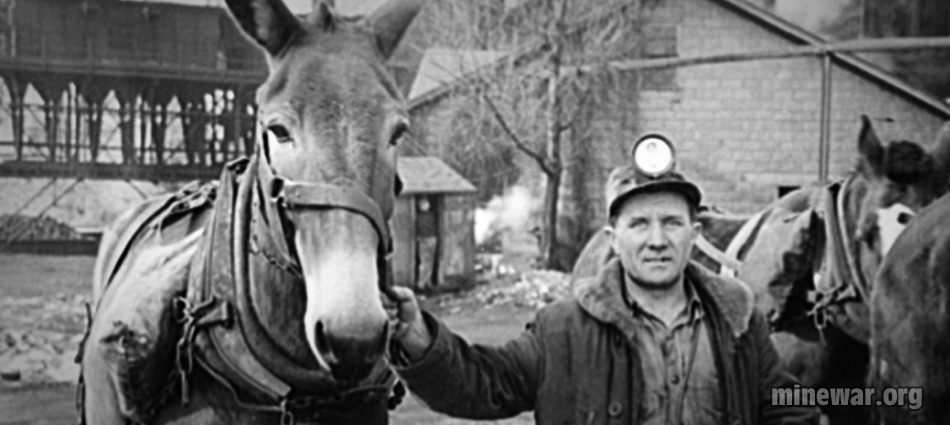minewar.org documenting the 1930's Illinois Mine War
Falling Backwards
“It was not unusual for the mine executive to come to the mine and conduct an investigation if a mule was injured or killed. But no such investigation ever took place when a miner was killed.” ~ Jack Battuello describes 1920’s mining conditions in Illinois.
Labor unions are commonly considered in a narrow light; organizations which bargain and press for better pay and benefits for their members. However, that’s far too limited a view when thinking of organized labor in the coal fields. As Battuello and his peers knew all too well, mine owners were obsessed with profits and considered human life disposable. The fight for humane safety standards was a rallying cry that contributed to the growth of the United Mine Workers of America (UMWA) in the early 20th century. And to this day the UMWA continues to play a important role in improving safety conditions in mines.
Although mules are no longer part of the mining industry, the callous disregard for human life in the mines seems to endure. And due to decades of persistent erosion of labor rights in the U.S., the UMWA lacks the influence and power it once held in the industry. In an unsafe mine, non-union workers are presented with the unenviable option to either speak up and be fired, or pipe down and pray for the best.
Government regulators offer little relief. As part of the coal companies’ obstinate drive for profits, massive political campaign contributions and lobbying ensure that the enforcement of mine safety standards are diluted adequately to allow unsafe mines to operate without the obligation to correct life-threatening conditions. But after decades of anti-regulatory “free market” hyperbole and policy, should anyone be surprised?
In response to Upper Big Branch Mine tragedy, last night MSNBC’s Rachel Maddow interviewed the excellent Jeff Biggers on the causes of mine disasters.
Visit msnbc.com for Breaking News, World News, and News about the Economy
Massey Energy Company, led by its notorious CEO Don Blankenship appears to be culpable in this latest tragedy. And if the opportunity exists, I sincerely hope those responsible are held criminally liable. But Massey thrives not because of any one individual, but because our system is built to support reckless greed.
While coal mining will never be completely safe, it’s clear that miners represented by the UMWA work in safer mines and are less likely to die on the job than workers with no union protections. If elected officials really want to address this problem, they need to end the widespread union-busting common in the coal industry and put teeth back into mine safety regulations.
I’ll believe that when I see it.
p.s. – Kudos to the Ken Ward, Jr. at the Charleston Gazette’s blog Coal Tattoo. Their coverage of this tragedy is second to none.
————————————————————————————
April 8 Update – Here’s a link to a press release from the United Mine Workers on Massey Energy Company’s safety record.
This excerpt speaks to the inadequacy of mine safety regulation enforcement in the U.S.:
“Mine Safety and Health Administration (MSHA) observed, ‘It’s quite evident something went very wrong here.’ Stricklin went on to say that ‘all explosions are preventable’…
However, MSHA has been prevented from taking more aggressive action at this mine because the operator has contested over 30 percent of the violations, leaving them in limbo until adjudicated by the Federal Mine Health and Safety Review Commission (FMHSRC). ‘That means no pattern of violations can be readily established at this mine, leaving MSHA without the ability to use stronger enforcement powers,’ [UMWA President Cecil] Roberts said.”
